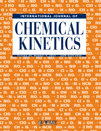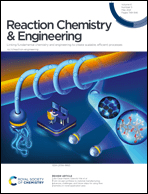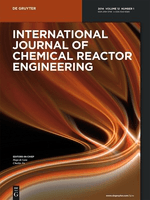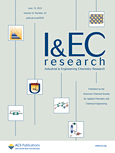
INTERNATIONAL JOURNAL OF CHEMICAL KINETICS
Scope & Guideline
Fostering innovation in the study of reaction mechanisms.
Introduction
Aims and Scopes
- Chemical Reaction Kinetics:
Exploration of the rates of chemical reactions, including the development of mathematical models to describe the kinetics of various processes. - Mechanistic Studies:
In-depth analyses of reaction mechanisms, focusing on the pathways and intermediates involved in chemical transformations. - Theoretical and Computational Approaches:
Utilization of computational methods and theoretical frameworks to predict reaction kinetics and mechanisms, including ab initio calculations and molecular dynamics simulations. - Environmental and Industrial Applications:
Investigation of kinetic processes relevant to environmental chemistry and industrial applications, such as pollutant degradation, catalysis, and energy production. - Advanced Experimental Techniques:
Application of innovative experimental methods to measure reaction rates and reveal kinetic parameters, including shock tube experiments and spectroscopic techniques.
Trending and Emerging
- Machine Learning and AI in Kinetics:
An increasing number of publications are exploring the application of machine learning and artificial intelligence to predict reaction kinetics and optimize experimental design, reflecting the journal's engagement with cutting-edge technology. - Green Chemistry and Sustainable Practices:
Research focusing on environmentally friendly processes, including the use of renewable resources and sustainable catalysts, is on the rise. This trend highlights the journal's commitment to addressing global environmental challenges. - Complex Reaction Networks:
There is a growing interest in investigating complex reaction networks and their kinetics, moving beyond simple reaction models to explore interconnected systems that better represent real-world chemical processes. - Interdisciplinary Approaches:
Emerging studies are increasingly drawing from interdisciplinary fields, such as materials science and biochemistry, to enhance the understanding of chemical kinetics, indicating a trend towards collaborative research that bridges traditional boundaries. - Real-Time Kinetic Monitoring:
Advancements in real-time monitoring techniques are gaining traction, allowing for the observation of reaction kinetics as they occur, thus providing richer datasets for analysis and interpretation.
Declining or Waning
- Traditional Kinetic Studies:
There seems to be a decline in studies focusing solely on traditional kinetic experiments without the incorporation of advanced computational or theoretical analyses. This reflects a shift towards more integrated approaches that combine theory and experiment. - Isolated Reaction Studies:
Research focusing on isolated reactions with limited applicability to broader mechanistic understanding appears to be waning. The trend is shifting towards studies that connect multiple reactions or provide insights into complex reaction networks. - Applications of Older Experimental Techniques:
There is a noticeable decrease in the use of older experimental techniques that do not leverage modern advancements in measurement technologies, indicating a preference for more sophisticated and precise methodologies.
Similar Journals

JOURNAL OF CHEMICAL SCIENCES
Connecting Ideas, Inspiring Discoveries in ChemistryThe JOURNAL OF CHEMICAL SCIENCES, published by the Indian Academy of Sciences, is a premier academic journal that serves the global community of chemists and researchers. With an ISSN of 0974-3626 and an E-ISSN of 0973-7103, this journal is pivotal in disseminating high-quality research across diverse areas of chemical sciences. As of 2023, it holds a respectable Q3 ranking in the field of Chemistry (miscellaneous) and ranks #215 out of 408 in General Chemistry according to Scopus, reflecting its commitment to advancing the discipline. Operating in an open-access format, the journal ensures that research findings are readily accessible to a broader audience, fostering collaboration and innovation. Established in 1980 and continuing to evolve, the journal's scope encompasses fundamental and applied chemistry, and aims to bridge gaps between theoretical and practical applications. With a mission to support the scientific community, the JOURNAL OF CHEMICAL SCIENCES is an essential resource for researchers, professionals, and students alike, providing a platform for the exchange of groundbreaking ideas and discoveries.

Reaction Chemistry & Engineering
Catalyzing Innovation in Reaction ChemistryReaction Chemistry & Engineering is an esteemed journal published by the Royal Society of Chemistry, dedicated to advancing the field of chemical engineering. With a focus on pivotal topics including catalysis, process technology, and fluid flow, this journal serves as a critical platform for researchers and professionals seeking to disseminate innovative findings and methodologies. As of 2023, it boasts impressive impact factors, ranking Q2 in Catalysis and consistently appearing in the Q1 categories for several related fields, thus recognizing its influence and relevance in the scientific community. With Scopus rankings placing it among the top 30 journals in multiple chemical engineering categories, Reaction Chemistry & Engineering encourages open dialogue and collaboration among scientists aiming to overcome contemporary challenges in chemical processes. This journal is vital for anyone involved in the development and application of chemical engineering, providing essential insights and fostering progress in this dynamic discipline. Explore the latest research and contribute to future innovations by engaging with the cutting-edge work presented in Reaction Chemistry & Engineering.

International Journal of Chemical Reactor Engineering
Shaping the Future of Chemical Reaction TechnologiesInternational Journal of Chemical Reactor Engineering, published by WALTER DE GRUYTER GMBH, serves as a vital platform for advancing knowledge in the field of chemical engineering, specifically focusing on reactor engineering. The journal, recognized by its ISSN 2194-5748 and E-ISSN 1542-6580, has maintained its commitment to quality research since its inception in 2002 and spans converged years through 2024. With a respectable Q3 ranking in the miscellaneous category of Chemical Engineering and a current Scopus rank of 158/273, it represents a significant resource for researchers aiming to publish innovative findings and practical applications. Although it operates under a subscription model, it still attracts attention for its rigorous standards and insightful contributions to the field. The journal’s focus on the interdisciplinary aspects of chemical reactor design, optimization, and safety underscores its importance in driving forward the technical and theoretical boundaries of chemical engineering. Addressed from Genthiner Strasse 13, D-10785 Berlin, Germany, the International Journal of Chemical Reactor Engineering is a must-read for professionals and scholars dedicated to pushing the frontiers of chemical reaction technologies.

DOKLADY PHYSICAL CHEMISTRY
Fostering Innovation in Physical and Theoretical ResearchDOKLADY PHYSICAL CHEMISTRY is a prominent peer-reviewed journal published by MAIK NAUKA/INTERPERIODICA/SPRINGER, focusing on advancements and research in the field of Physical and Theoretical Chemistry. With the ISSN 0012-5016 and E-ISSN 1608-3121, this journal serves as a vital platform for researchers and practitioners to disseminate their findings and insights from 1996 to the present. Despite its current Q4 ranking in the 2023 category of Physical and Theoretical Chemistry, the journal has shown significant potential for visibility and engagement within the academic community, ranking #149 out of 189 in its respective field according to Scopus metrics, highlighting its dedicated readership. While the journal is not open access, it remains an essential resource for those seeking in-depth research articles, reviews, and commentary within this dynamic discipline. As the field continues to evolve, DOKLADY PHYSICAL CHEMISTRY plays a crucial role in fostering scientific dialogue and collaboration among researchers, professionals, and students worldwide.

JOURNAL OF CHEMICAL RESEARCH
Innovating Chemistry: Where Research Meets Discovery.JOURNAL OF CHEMICAL RESEARCH, published by SAGE PUBLICATIONS LTD, serves as a pivotal platform for scholars and practitioners in the field of Chemistry. With its ISSN 1747-5198 and E-ISSN 2047-6507, this journal has established itself as a reliable source of innovative research since its inception in 2000. The journal's comprehensive scope encompasses various facets of chemical research, providing a broad spectrum of articles that foster scientific advancement and technological innovation. Ranked in the Q3 tier of miscellaneous chemistry journals in 2023, with a Scopus rank of #246 out of 408, it represents a solid outlet for emerging and established researchers alike. Although currently not an open-access journal, its rigorous peer-review process ensures that only high-quality studies are published, catering to the academic and professional community's demand for credible and impactful findings. Positioned in the vibrant research landscape of the United Kingdom, the JOURNAL OF CHEMICAL RESEARCH is dedicated to expanding the frontiers of chemical sciences and is an essential resource for anyone committed to advancing this dynamic field.

Russian Journal of Physical Chemistry A
Advancing Knowledge in Theoretical and Applied ChemistryWelcome to the Russian Journal of Physical Chemistry A, a prominent publication in the field of Physical and Theoretical Chemistry, published by MAIK NAUKA/INTERPERIODICA/SPRINGER. This journal, with ISSN 0036-0244 and E-ISSN 1531-863X, has been a vital platform for disseminating significant research findings since its inception in 1996. As a key contributor to academic discourse, it aims to provide high-quality articles that explore fundamental and applied aspects of physical chemistry, thereby enhancing understanding and innovation in the discipline. Although currently categorized as Q4 by Scopus (2023), the journal is positioned to evolve with the scholarly landscape, continually striving to improve its impact and relevance. With no open access options available, subscription to this journal is essential for those keen on enriching their knowledge and staying current with advancements in physical chemistry. Researchers, professionals, and students alike will find invaluable insights and robust discussions that can inspire their work and studies.

INDUSTRIAL & ENGINEERING CHEMISTRY RESEARCH
Exploring Breakthroughs in Chemistry and EngineeringINDUSTRIAL & ENGINEERING CHEMISTRY RESEARCH, published by the American Chemical Society, is a pivotal journal that disseminates high-quality research in the fields of Chemical Engineering, Chemistry, and Industrial and Manufacturing Engineering. With an impressive impact factor, this journal ranks in the top quartile (Q1) across multiple categories, reflecting its significance and influence within the scientific community. Since its inception in 1987, IECR has provided a platform for researchers, professionals, and students to publish innovative findings that advance the understanding and application of engineering chemistry. Though it operates under a subscription model, the journal continues to foster collaboration within the field, inviting contributions that span theoretical advancements, experimental studies, and practical applications. Whether you are engaged in academia or industry, IECR serves as a vital resource for staying abreast of the latest developments in chemical and engineering research.

MATCH-COMMUNICATIONS IN MATHEMATICAL AND IN COMPUTER CHEMISTRY
Innovating Solutions through Mathematical InsightsMATCH-COMMUNICATIONS IN MATHEMATICAL AND IN COMPUTER CHEMISTRY, published by the University of Kragujevac, Faculty of Science, stands at the intersection of mathematical theories and computational applications within the field of chemistry. This esteemed journal, recognized for its contributions to applied mathematics and miscellaneous chemistry, boasts impressive Scopus rankings, being placed in the Q1 quartile for both applied mathematics and miscellaneous chemistry, as well as achieving significant rankings in computational theory and computer science applications. With an enduring history since 1990 and continuing through 2025, MATCH not only serves as a pivotal platform for scholarly communication but also aims to bridge the gap between theoretical research and practical application. This journal is essential for researchers, professionals, and students seeking to push the boundaries of knowledge in these dynamic fields.

KINETICS AND CATALYSIS
Unveiling Mechanisms, Inspiring BreakthroughsKinetics and Catalysis is a pioneering journal dedicated to advancing the field of catalytic science and chemical kinetics, published by Pleiades Publishing Inc. Based in the Russian Federation, this journal serves as a critical platform for disseminating high-quality research related to the mechanisms of chemical reactions and innovative catalytic processes. Although currently not an open access journal, it maintains academic rigor through a comprehensive peer-review process that ensures the relevance and integrity of its published works. With a history dating back to 1968, Kinetics and Catalysis has evolved through various converged years, reflecting its commitment to interdisciplinary research within the realms of chemistry, catalysis, and the computational aspects of modeling and simulation. As evidenced by its Scopus rankings and quartiles, it stands as an influential, albeit niche, journal, appealing to researchers, professionals, and students eager to explore the intricacies of chemical transformations. The journal’s robust archive offers an invaluable resource for those seeking to expand their understanding of both theoretical and practical approaches to catalysis.

THEORETICAL CHEMISTRY ACCOUNTS
Empowering Researchers with Open Access to Theoretical BreakthroughsTHEORETICAL CHEMISTRY ACCOUNTS is a prestigious journal dedicated to promoting the advancement of theoretical and computational chemistry. Published by Springer, this journal has become a vital resource for researchers, professionals, and students seeking to explore innovative theoretical approaches in chemistry since its inception in 1996. With a current impact factor positioning it in the Q3 category of Physical and Theoretical Chemistry, it underscores its importance in the academic landscape, ranking 113 out of 189 in its field according to Scopus. The journal embraces an Open Access model, making cutting-edge research widely accessible to the global community. Researchers are encouraged to submit their latest findings and theoretical advancements, contributing to the ever-expanding body of knowledge within this dynamic field. Addressing contemporary challenges and breakthroughs, THEORETICAL CHEMISTRY ACCOUNTS serves as an essential platform for dialogue and discovery among scholars dedicated to the intersection of chemistry and theory.